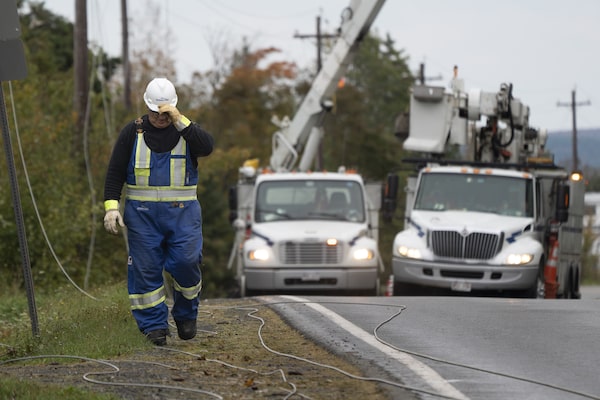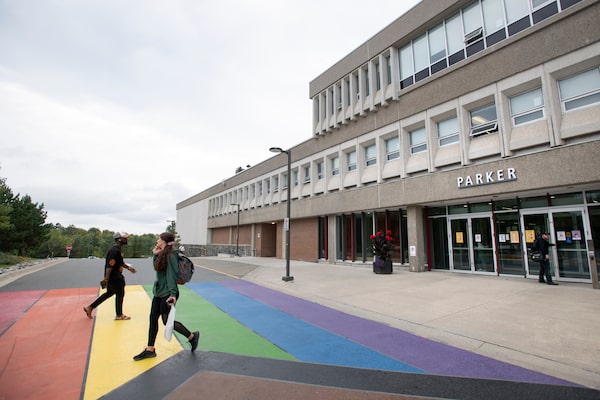Good evening, let’s start with today’s top stories:
The losses are piling up for Hockey Canada, an organization that is accustomed to winning – at least on the ice. Today, Tim Hortons pulled its sponsorship of Hockey Canada for the 2022-23 season, which importantly includes the world junior hockey championship in December. At the same time, regional hockey associations in Ontario and Quebec said they would be withholding registration fees rather than sending them to the national federation.
At hearings in Ottawa this week, MPs criticized Hockey Canada for failing to properly investigate allegations made by a woman who said she was sexually assaulted by members of the 2018 national junior team after a Hockey Canada fundraiser, and for trying to sweep the matter under the rug.
Putin asserts control over Zaporizhzhia nuclear plant, Ukraine objects
With Russia’s illegal annexation of four Ukrainian regions made official today, attention has turned to Zaporizhzhia, the annexed region that is home to the nuclear power plant in the city of the same name.
Russian President Vladimir Putin ordered his government to take control of the Zaporizhzhia plant, Europe’s largest, but the head of Ukraine’s state nuclear energy company said he was taking charge instead, and urged workers there not to sign any documents with its Russian occupiers.
The possibility of a nuclear disaster at the plant remains an international concern because of shelling in the area for which Moscow and Kyiv have blamed each other.
Meanwhile, workers from the plant spoke to reporters this week about their fears of being abducted and tortured or killed by Russian forces occupying the facility.
How storm-struck regions of North America are faring in the aftermath

Power crews work to fix power lines near Lower Barneys River in Pictou County, N.S., on Sept. 28, 2022,Darren Calabrese/The Canadian Press
With thousands of people still in the dark after enduring fierce recent storms in Atlantic Canada and other parts of North America, rebuilding plans are facing hurdles before they can even get started.
In Nova Scotia and Prince Edward Island, some 15,000 homes and businesses were without electricity 11 days after the storm Fiona walloped the region, to say nothing of the many rural residents who are without running water because the pumps in their wells don’t work.
Nova Scotia Public Works Minister Kim Masland said the rebuilding effort, once it gets started, will be competing for labour with continuing construction projects – driving up prices and extending timelines.
In the United States, President Joe Biden surveyed Fort Myers, Fla., by helicopter today after Hurricane Ian had a devastating impact. And in Puerto Rico, which was walloped by Hurricane Fiona two weeks ago, more than 100,000 homes and business were still without power.
This is the daily Evening Update newsletter. If you’re reading this on the web, or it was sent to you as a forward, you can sign up for Evening Update and more than 20 more Globe newsletters here. If you like what you see, please share it with a friend.
ALSO ON OUR RADAR
Driverless delivery vehicles in Toronto: In a partnership with a startup called Gatik, Loblaw has been testing autonomous driving technology in Ontario since 2020, with a human “safety driver” on board. In August, the company began the next phase of its test – without the driver.
Baldwin settles Rust suit: The family of the cinematographer Alec Baldwin accidentally shot dead on the set of Rust has reached a settlement with the actor and the film’s producers.
House sales down: In Canada’s three biggest cities – Toronto, Montreal and Vancouver – September figures show a major drop in home sales.
Ottawa seeking emissions feedback: The federal government has released its long-awaited draft of greenhouse-gas emissions guidelines for new oil and gas projects. Comments on the plan will be accepted until Dec. 3.
MARKET WATCH
Wall Street stocks closed lower today after data showed U.S. labour demand remained strong, and as Federal Reserve officials stuck to their hawkish message that interest rates will stay higher for longer.
This followed a positive start to the week, and an afternoon rally today was seen as “a favourable indicator that this rally could have legs,” said Sam Stovall, chief investment strategist at CFRA Research in New York.
The Dow Jones Industrial Average fell 42.45 points or 0.14 per cent to 30,273.87, the S&P 500 lost 7.65 points or 0.20 per cent to 3,783.28, and the Nasdaq Composite dropped 27.77 points or 0.25 per cent to 11,148.64. The Toronto Stock Exchange’s S&P/TSX Composite Index ended down 135.90 points or 0.7 per cent at 19,235.09.
The Canadian dollar was unchanged, and could be bought for 73.42 US cents.
Got a news tip that you’d like us to look into? E-mail us at tips@globeandmail.com. Need to share documents securely? Reach out via SecureDrop.
TALKING POINTS
Trudeau government must explain why Iran’s Revolutionary Guard isn’t listed as a terrorist entity
“At the very least, the Canadian government owes the 50,000 people who marched in Richmond Hill over the weekend – and many more who have been watching with horror as the Iranian regime violently cracks down on protesters – an explanation.” – Robyn Urback
The U.S. is losing China to Russia. How senseless is that?
“Where is the logic, it need be asked, in Washington proceeding with a policy track that loses China to Russia? ... Instead of doing everything in their power to find accommodations with China and offset any Moscow-Beijing bonding, Democrat and Republican lawmakers are in bipartisan agreement on a confrontational approach.” – Lawrence Martin
LIVING BETTER
Loretta Lynn found country music stardom by way of Vancouver
She may have been a proud Kentuckian singer-songwriter, but country star Loretta Lynn, who died at the age of 90 on Tuesday, may never have made it to the Grand Ole Opry if not for the help of a Canadian benefactor. Norm Burley was a lumber company owner in Vancouver who recognized Lynn’s potential on a regional TV appearance. In early 1960, he backed up his hunch by bankrolling her first studio session.
Indigenous artists play with scale in Arctic/Amazon show at Power Plant gallery
The exhibition Arctic/Amazon, now showing at Toronto’s Power Plant gallery, began with a 2019 symposium discussing similarities between Indigenous issues in North and South America despite their very different climates. One of the most pronounced themes is scale, a making of little things big and big things little, which has obvious political implications as these artists assert their Indigenous presence.
TODAY’S LONG READ

The R.D. Parker Building on the Laurentian University campus in Sudbury, Ont.Fred Lum/The Globe and Mail
Laurentian University’s creditor protection plan offers a new lease on life, but big challenges ahead
When Laurentian University declared insolvency in February, 2021, Janice Liedl kept her job. But her department vanished. More than 100 of her tenured colleagues were fired and dozens of academic programs were slashed. The future of the entire university, a lynchpin in Sudbury and Northern Ontario, was cast in doubt.
Rather than receive a financial bailout from the provincial government, as other struggling universities have done in the past, Laurentian filed for protection under the Companies’ Creditors Arrangement Act, a law designed for private corporations that allows considerable leeway to terminate employees and cut costs. It had never before been applied to a publicly funded university.
On Sept. 14 of this year, the university’s creditors voted to approve a plan of arrangement that will settle the university’s debts at a fraction of their value. The result is a relief to the university’s administration and to its staff and faculty. Had the vote failed, the university said its only option would have been to dissolve.
Dr. Liedl said it feels like Laurentian, having survived a brush with death, is perched on a ledge. It’s not home safe, but it can catch its breath and consider its next move.
Read the full report by Joe Friesen.
Evening Update is compiled and written weekdays by an editor in The Globe’s live news department. If you’d like to receive this newsletter by e-mail every weekday evening, go here to sign up. If you have any feedback, send us a note.